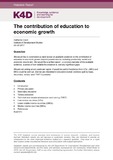| dc.contributor.author | Grant, Catherine | |
| dc.date.accessioned | 2017-07-20T15:39:07Z | |
| dc.date.available | 2017-07-20T15:39:07Z | |
| dc.date.issued | 2017-03-03 | |
| dc.identifier.citation | Grant, C. (2017). The Contribution of Education to Economic Growth. K4D Helpdesk Report. Brighton, UK: Institute of Development Studies. | en |
| dc.identifier.uri | https://opendocs.ids.ac.uk/opendocs/handle/20.500.12413/13117 | |
| dc.description.abstract | There are many reasons why education is important, this report focuses on its contribution to economic growth and outcomes. Education ‘can be defined as the stock of skills, competencies, and other productivity-enhancing characteristics’ (WEF 2016). In general, education—as a critical component of a country’s human capital—increases the efficiency of each individual worker and helps economies to move up the value chain beyond manual tasks or simple production processes (WEF 2016). Human capital has long been considered the most distinctive feature of the economic system and further work has proven the impact of education on productivity growth empirically.
The World Economic Forum 2016 suggested three channels through which education affects a country’s productivity. First, it increases the collective ability of the workforce to carry out existing tasks more quickly. Second, secondary and tertiary education especially facilitate the transfer of knowledge about new information, products, and technologies created by others (Barro and Lee 2010). Finally, by increasing creativity it boosts a country’s own capacity to create new knowledge, products, and technologies.
There is a wealth of literature on this topic, showing the long held expectation that human capital formation (a population’s education and health status) plays a significant role in a country’s economic development. Better education leads not only to higher individual income but is also a necessary (although not always sufficient) precondition for long-term economic growth (IIASA 2008). Woessmann 2015 surveys the most recent empirical evidence stating that it shows the crucial role of education for individual and societal prosperity.
Education is a leading determinant of economic growth, employment, and earnings. Ignoring the economic dimension of education would endanger the prosperity of future generations, with widespread repercussions for poverty, social exclusion, and sustainability of social security systems (Woessman 2015). For every US$1 spent on education, as much as US$10 to US$15 can be generated in economic growth (UNESCO 2012). If 75% more 15-year-olds in forty-six of the world’s poorest countries were to reach the lowest OECD benchmark for mathematics, economic growth could improve by 2.1% from its baseline and 104 million people could be lifted out of extreme poverty (UNESCO 2012). | en |
| dc.language.iso | es | en |
| dc.publisher | Institute of Development Studies | en |
| dc.relation.ispartofseries | K4D Helpdesk Report;055 | |
| dc.rights.uri | https://www.nationalarchives.gov.uk/doc/open-government-licence/version/3/ | en |
| dc.subject | Economics | en |
| dc.subject | Economic Development | en |
| dc.subject | Education | en |
| dc.subject | Finance | en |
| dc.subject | Governance | en |
| dc.subject | Taxation | en |
| dc.title | The Contribution of Education to Economic Growth | en |
| dc.type | Helpdesk | en |
| dc.rights.holder | DFID | en |
| dcterms.dateAccepted | 2017-03-03 | |
| rioxxterms.funder | Default funder | en |
| rioxxterms.identifier.project | K4D | en |
| rioxxterms.version | AO | en |
| rioxxterms.funder.project | 9ce4e4dc-26e9-4d78-96e9-15e4dcac0642 | en |

